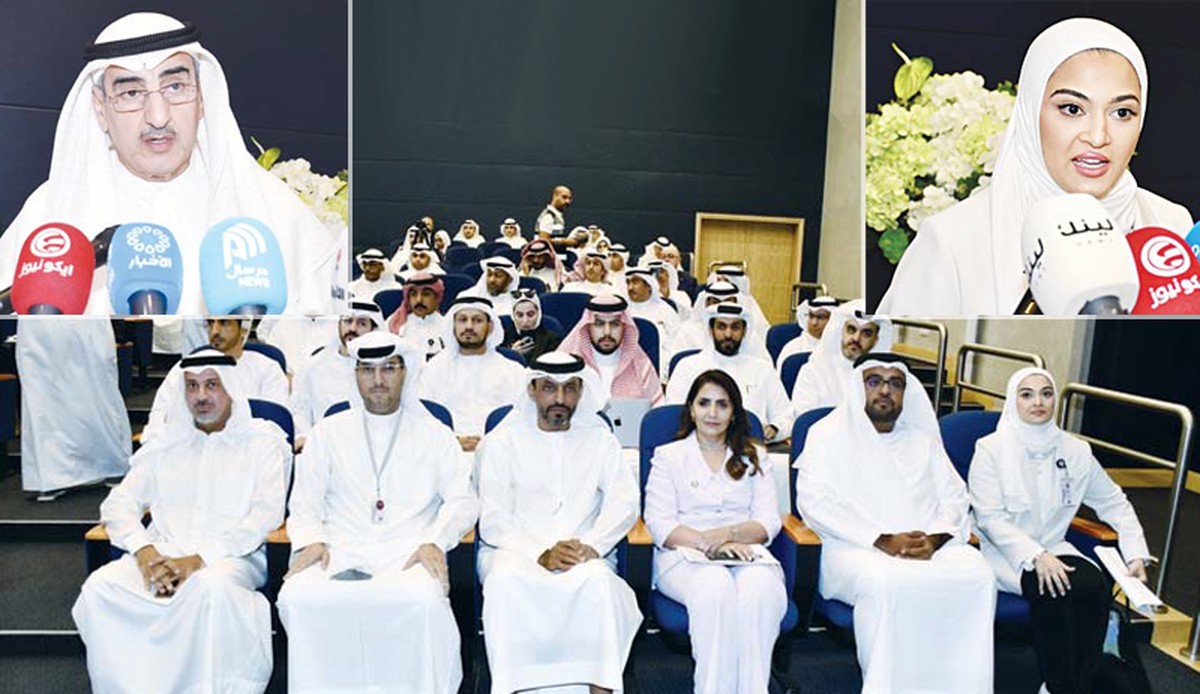25/08/2025
25/08/2025

(Left) Abdulaziz Al-Ibrahim, Chairman of the General Anti-Corruption Authority (Nazaha) (Right) Anwar Al-Qadeeri, Director of the International Cooperation Department at the Authority (Below)Leaders in integrity and transparency from across the Gulf exchange knowledge at the GCC Anti-Corruption Experts Forum.
KUWAIT CITY, Aug 25: Chairman of Kuwait Anti-Corruption Authority (Nazaha) Abdulaziz Al-Ibrahim said there are multiple methods of combating corruption, some of which focus on prevention before it occurs, and others on monitoring and evaluation, indicating that prevention is a fundamental pillar of the work of the authority and Kuwait is among the leading countries in this field, thanks to the concerted efforts of all ministries and institutions.
Al-Ibrahim made the statement Monday on the sidelines of the launch of the annual event of the Gulf Cooperation Council (GCC) Anti-Corruption Expert Committee with the theme, “Mechanisms for Measuring Corruption: International Experiences and National Applications.” Present at the event were Gulf officials and experts from agencies concerned with promoting integrity and combating corruption in GCC countries.
It was held within the framework of Kuwait’s presidency -- represented by Nazaha -- of the GCC Ministerial Committee for Combating Corruption. Al-Ibrahim pointed that combating corruption is not solely the responsibility of the Integrity Commission, but rather a comprehensive societal responsibility requiring clear laws, regulations and procedures. He explained that the member states of the Convention against Corruption undergo annual reviews, and international recommendations often call for amendments to legislation in order to strengthen governance and transparency. He highlighted one of Kuwait’s most notable successes—the Sahel application— which has become a model referenced in regional and international conferences.
He stated the application contributed to reducing paperwork and direct contact between clients and employees by more than 98 percent, thereby, closing the doors to bribery and other forms of corruption. He stressed the importance of cooperation with international organizations and GCC states to unify visions and positions, confirming that Kuwait will raise this issue at a meeting scheduled for December in Qatar, based on the influential role played by GCC countries in this field.
In his speech at the event, Al-Ibrahim underscored Kuwait’s awareness that systems and tools for measuring corruption and assessing its risks is a primary and pivotal objective in reinforcing integrity and consolidating transparency within societies. He stressed that serious work to prevent and combat corruption requires a clear strategic and procedural vision—one that should not rely on mere impressions or abstract societal assessments, as it must be supported by accurate data and reliable indicators that can significantly contribute to developing legislation and procedures, strengthening and correcting policies, and overcoming the challenges in combating corruption, both nationally and internationally.
Meanwhile, Anwar Al-Qadeeri, Director of the International Cooperation Department at Nazaha and Chairperson of the GCC Anti-Corruption Experts Committee, affirmed the commitment of the authority to strengthen international cooperation among agencies in charge of promoting integrity and combating corruption. She stressed the importance of showcasing national and regional efforts, and of exchanging best practices and expertise among GCC countries. She also praised the role of the Ministerial Committee on Combating Corruption and its subcommittees in strengthening Gulf systems to combat corruption and in showcasing GCC countries’ efforts at regional and international levels.
She reaffirmed Nazaha’s commitment to achieve tangible outcomes during Kuwait’s chairmanship of the Ministerial Committee on Combating Corruption, within the framework of its presidency of the 2024 Gulf Cooperation Council Summit and its subcommittees. The event’s program included specialized presentations on mechanisms and methodologies for measuring corruption, as well as on measuring community awareness in the areas of integrity, accountability and transparency.
These presentations focused on the experiences of the United Arab Emirates (UAE), Kingdom of Bahrain, Kingdom of Saudi Arabia, Sultanate of Oman, State of Qatar and State of Kuwait. The event took place amid growing international interest in developing scientific tools and indicators to measure corruption. Recent initiatives include the Statistical Framework for Measuring Corruption issued by the United Nations Office on Drugs and Crime (UNODC), the Global Initiative to Measure Corruption (GIMC) of the United Nations Development Programme (UNDP), and the Global Programme to Measure Corruption (GPMC) of the International Anti-Corruption Academy (IACA).
This is in addition to two United Nations resolutions adopted by the Conference of the States Parties to the United Nations Convention against Corruption (COP), focusing on methodologies and indicators for measuring corruption and evaluating the effectiveness of anti-corruption mechanisms. These developments are relevant as the issue of corruption measurement will be featured at the 11th session of COP that will be held in Doha, Qatar in December 2025.
At the conclusion of its meeting, the Committee of Experts on Combating Corruption recommended the development of scientific frameworks and methodologies for measuring corruption. Such frameworks should be comprehensive, transparent and aligned with international standards, while ensuring a balance between perceptions and objective data to achieve more accurate and reliable assessments.
The recommendations also called for evaluating the effectiveness of national measures to combat corruption, strengthening Gulf and international cooperation in this field, exchanging expertise and best practices, and benefiting from programs and tools developed by the United Nations and specialized international organizations. These efforts aim to improve data collection, monitor trends, and enhance the effectiveness of initiatives promoting integrity.
The recommendations included active participation in international conferences and forums on improving methods for measuring corruption, as well as supporting national initiatives through strategies, periodic surveys, statistical indicators, and databases in line with international standards.
They stressed the need to monitor international indicators concerned with promoting integrity and combating corruption in order to analyze the position of GCC states and to lay down executive plans for improving performance.
By Fares Ghaleb
Al-Seyassah/Arab Times Staff
Al-Seyassah/Arab Times Staff


